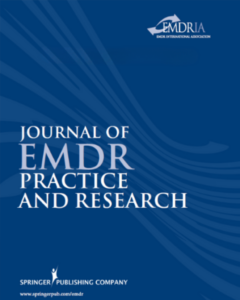Eye movement desensitization and reprocessing in the treatment of trauma with mild intellectual disabilities: A case study (Advances in Mental Health and Intellectual Disabilities)
Paper exploring the effectiveness of EMDR therapy in an individual with mild intellectual disabilities currently detained in secure care.
Read MoreTreating mild traumatic brain injury with EMDR (Lankaweb)
The survivors of mild traumatic brain injury would be benefitted by an effective mode of psychotherapy such as EMDR.
Read MoreTreating PTSD in patients with psychosis: A within-group controlled feasibility study examining the efficacy and safety of evidence-based PE and EMDR protocols (Behavior Therapy)
This feasibility trial suggests that PTSD patients with comorbid psychotic disorders benefit from trauma-focused treatment such as PE & EMDR.
Read MoreThe impact of eye movements and tones on disturbing memories involving PTSD and other mental disorders (Journal of Behavior Therapy and Experimental Psychiatry)
Study was aimed at investigating the effects of taxing working memory in EMDR during recall of negative memories in 32 patients with PTSD.
Read MoreA Q-Methodology Evaluation of an EMDR Europe HAP Facilitators Training in Pakistan (Journal of EMDR Practice and Research)
Evaluation of EMDR Europe Humanitarian Assistance Program (HAP) facilitators’ training in Pakistan in the aftermath of the 2005 earthquake.
Read MoreUsing Compassionate Mind Training as a Resource in EMDR: A Case Study (Journal of EMDR Practice and Research)
Compassionate mind training (CMT) as a resource in EMDR treatment after a recent trauma with psychological distress & somatic symptoms.
Read MoreEMDR in Psychosis: Guidelines for Conceptualization and Treatment (Journal of EMDR Practice and Research)
A significant proportion of clients with psychosis have experienced childhood trauma and suffer from comorbid posttraumatic stress disorder.
Read MoreIs EMDR an Evidenced-Based Treatment for Depression? A Review of the Literature (Journal of EMDR Practice and Research)
Studies under way may produce evidence needed to expand the recommendations for using EMDR with more than just PTSD, such as depression.
Read MoreNo effects of eye movements on the encoding of the visuospatial sketchpad and the phonological loop in healthy participants: Possible implications for eye movement desensitization and reprocessing therapy (Personality and Individual Differences)
The study’s aim is to explore how eye movements affect the information encoding of the visuospatial sketchpad and the phonological loop.
Read More



